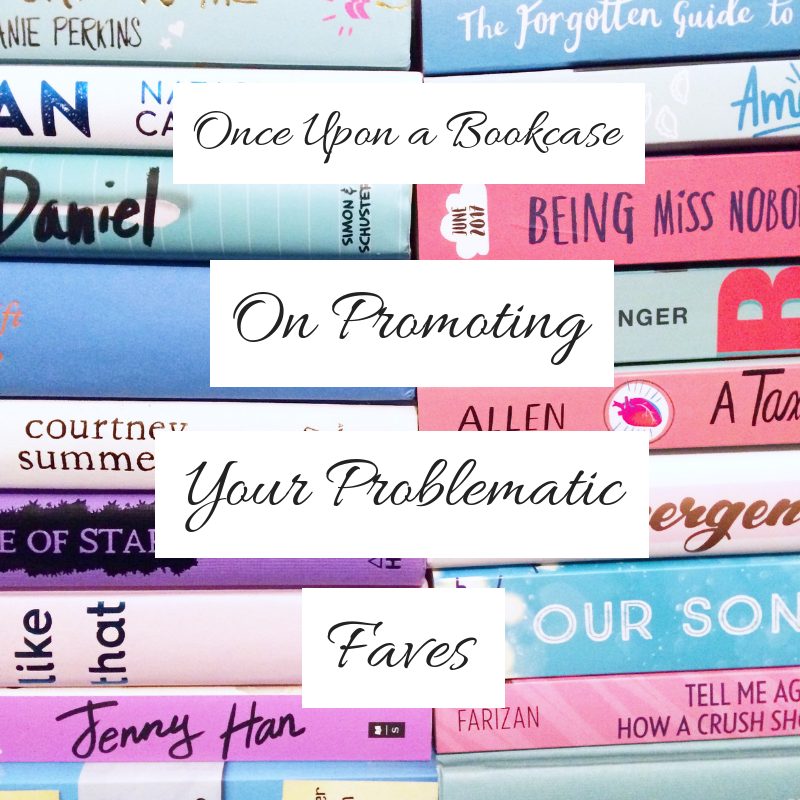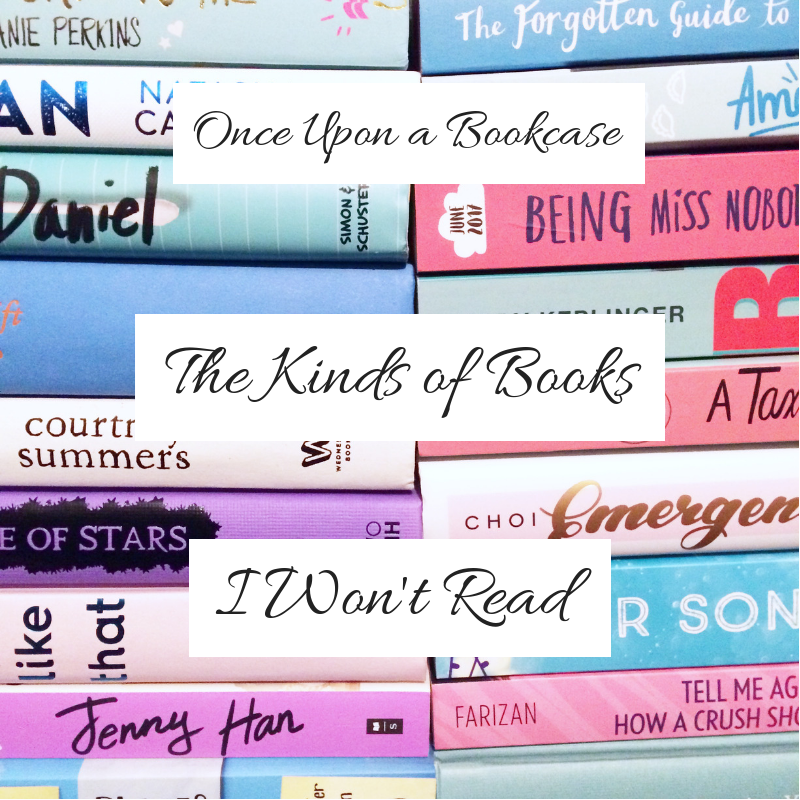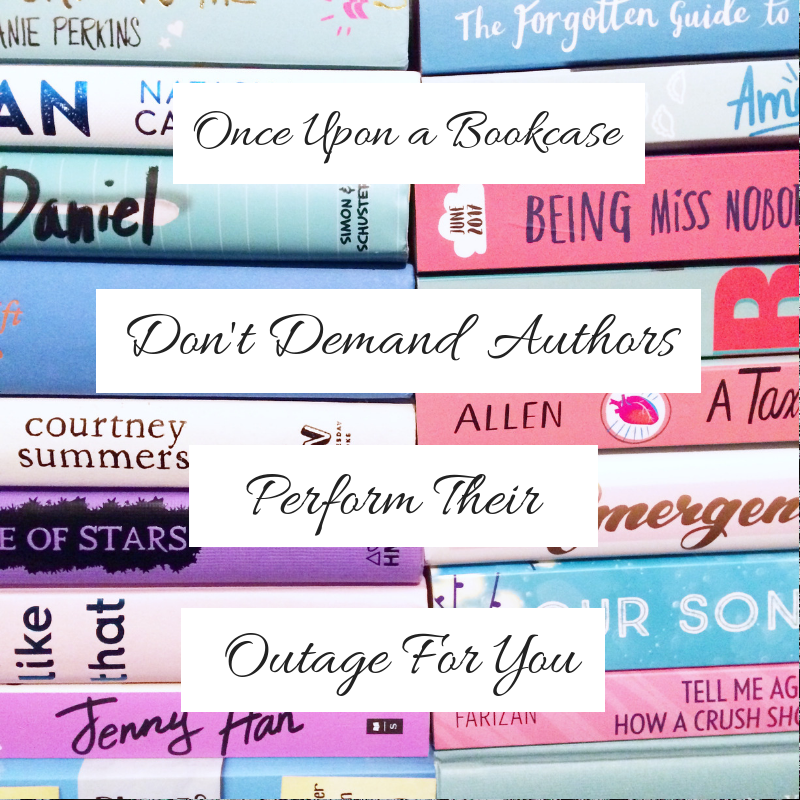
On Promoting Your Problematic Faves
Today, I really want to talk about problematic faves, because I've seen some things recently that have kind of wound me up.
It's to do with high profile/quite popular YA authors and their books, and how those who love their books seems to simply ignore their problematic behaviour/books. I've also seen a number of new releases with problematic content that have been raved about. It is very possible that maybe those readers are unaware of the problems with the authors and/or the books, especially in regards to new releases, but I don't think it's that's true in all cases when it comes to high profile authors.
There is absolutely nothing wrong with having problematic faves. I have them. It really annoys me that these books I love are problematic, because I love them so much and just wish they didn't have issues. But what is important is the decisions you make regarding those books. I am very much of the opinion that book influencers - book bloggers, booktubers, bookstagrammers - have a responsibility to their audience - especially so if their audience may include teens, which is highly possible if your platform highly features YA. The responsibility is to not harm them, and to make them aware of problematic content in books, or authors who behave badly. But the first part is most important - not to harm. If you're constantly promoting books/authors that are problematic - whose content is offensive, or whose behaviour has hurt people - what are you saying to the readers who have been hurt? And what are you saying to your privileged readers? I know this is uncomfortable, but I really need you to sit with these questions - as I said, especially if your audience includes teens - because this is important. Because it looks to me like you're saying the feelings of those hurt don't matter, and that you're condoning problematic content and/or behaviour.
As I said, I'm not saying you can't have problematic faves. You can love those books, you can read those books over and over. But , if you know those books/the author is problematic, in my opinion, you should not be talking about them. You shouldn't be raving about them, posting photos of them, declaring your love for them from the rooftops. Yes, those books may personally mean a lot to you. Those books may have got you through a hard time. No-one is taking those books away from you, and no-one is telling you, you can't love them. But if people have been hurt, I really think it's time to acknowledge that, maybe, and definitely stop talking about them. Stop promoting them. You can do what you want with your money, it's your money, but you might also want to think about what your money is supporting. That's all I'm saying on this point: just think about it. But please, please, enough of promoting problematic books.
Now, as I said earlier, people may not realise a book is problematic, if they're privileged they may miss things. You may also not know if an author has behaved badly. I've seen a few recent releases have been called out as problematic, but are still being raved about, so I'm going to list those here, plus a few other ones.
So what do you do when you discover your fave book/author is problematic, and you've raved about them? I can only tell you what I do. When I discover a book is problematic, I edit my review and put a disclaimer at the top, stating that I've discovered the book is problematic due to the specific problematic content (I.E. ableism, racism, etc.), and link to where I discovered this, be it review or tweet/Twitter thread. I mention that I didn't previously notice it was problematic due to my privilege, and because of this I can no longer recommend the book with good conscience, but state that I'm leaving my review as it is for purposes of transparency. And I paste the same at the top of my Goodreads reviews.
I think it's really important, for myself, to keep the old reviews there. I don't want to hide that I missed the problematic elements. I think it's important, being as privileged as I am, to be honest and open about times when I've made a mistake and missed something. If I'm going to call out problematic books when I read them, I need to not act like I'm perfect and get it right every time. It's the fact that I get things wrong and am educated that I'm able to spot mistakes later down the line. So yes, I leave my reviews, whether positive or negative (mostly positive), as they are, but with the disclaimer at the beginning.
And then I never promote those books again. I won't tweet about them, I won't include them in recommendation list posts, I won't add them to the bottom of reviews of other books as "you might also like" titles. I may still love them, I may still read them, but I will not promote them - because I have a responsibility to my audience.
I also highly suggest you check out Vicky of Vicky Who Reads' post, So. Your Favourite Books are Problematic. Now What?, which is very detailed, but also kind to readers who love problematic books. Because we do mess up, those in privileged positions do miss things - as I've pointed out above, I have myself. But it's what we do once we know that's important.
With that in mind, if I have a review on my blog of a book that is problematic, where I have no disclaimer, do please let me know. I don't want to be promoting problematic books, and if I've missed something and I'm not yet aware, I'd like to know. I don't want to come across as a hypocrit here.
But if you know a book or an author is problematic, and you ignore this and continue to rave and declare your love on every platform you have, I'm sorry, but I think that's pretty crappy behaviour, and you need to take a long, hard look at yourself.
You may also like:




Obviously, this is just my opinion, but what are your thoughts on book influencers promoting their problematic faves? Do you disagree with me? Or is there anything I've missed out in this post you think needs mentioning? Let me know in the comments!
It's to do with high profile/quite popular YA authors and their books, and how those who love their books seems to simply ignore their problematic behaviour/books. I've also seen a number of new releases with problematic content that have been raved about. It is very possible that maybe those readers are unaware of the problems with the authors and/or the books, especially in regards to new releases, but I don't think it's that's true in all cases when it comes to high profile authors.
There is absolutely nothing wrong with having problematic faves. I have them. It really annoys me that these books I love are problematic, because I love them so much and just wish they didn't have issues. But what is important is the decisions you make regarding those books. I am very much of the opinion that book influencers - book bloggers, booktubers, bookstagrammers - have a responsibility to their audience - especially so if their audience may include teens, which is highly possible if your platform highly features YA. The responsibility is to not harm them, and to make them aware of problematic content in books, or authors who behave badly. But the first part is most important - not to harm. If you're constantly promoting books/authors that are problematic - whose content is offensive, or whose behaviour has hurt people - what are you saying to the readers who have been hurt? And what are you saying to your privileged readers? I know this is uncomfortable, but I really need you to sit with these questions - as I said, especially if your audience includes teens - because this is important. Because it looks to me like you're saying the feelings of those hurt don't matter, and that you're condoning problematic content and/or behaviour.
As I said, I'm not saying you can't have problematic faves. You can love those books, you can read those books over and over. But , if you know those books/the author is problematic, in my opinion, you should not be talking about them. You shouldn't be raving about them, posting photos of them, declaring your love for them from the rooftops. Yes, those books may personally mean a lot to you. Those books may have got you through a hard time. No-one is taking those books away from you, and no-one is telling you, you can't love them. But if people have been hurt, I really think it's time to acknowledge that, maybe, and definitely stop talking about them. Stop promoting them. You can do what you want with your money, it's your money, but you might also want to think about what your money is supporting. That's all I'm saying on this point: just think about it. But please, please, enough of promoting problematic books.
Now, as I said earlier, people may not realise a book is problematic, if they're privileged they may miss things. You may also not know if an author has behaved badly. I've seen a few recent releases have been called out as problematic, but are still being raved about, so I'm going to list those here, plus a few other ones.
- Spin the Dawn by Elizabeth Lim - Ableist and homophobic content. More info of ableism here and homophobia here.
- All of Us With Wings by Michelle Ruiz Keil - Romanticises paedophilia. See this review.
- The Raven King by Maggie Stiefvater - Racist content. See this review.
- Maggie Stiefvater in general - Problematic in numerous ways. More info here.
- John Green in general - Problematic in numerous ways. More info here, here and here.
So what do you do when you discover your fave book/author is problematic, and you've raved about them? I can only tell you what I do. When I discover a book is problematic, I edit my review and put a disclaimer at the top, stating that I've discovered the book is problematic due to the specific problematic content (I.E. ableism, racism, etc.), and link to where I discovered this, be it review or tweet/Twitter thread. I mention that I didn't previously notice it was problematic due to my privilege, and because of this I can no longer recommend the book with good conscience, but state that I'm leaving my review as it is for purposes of transparency. And I paste the same at the top of my Goodreads reviews.
I think it's really important, for myself, to keep the old reviews there. I don't want to hide that I missed the problematic elements. I think it's important, being as privileged as I am, to be honest and open about times when I've made a mistake and missed something. If I'm going to call out problematic books when I read them, I need to not act like I'm perfect and get it right every time. It's the fact that I get things wrong and am educated that I'm able to spot mistakes later down the line. So yes, I leave my reviews, whether positive or negative (mostly positive), as they are, but with the disclaimer at the beginning.
And then I never promote those books again. I won't tweet about them, I won't include them in recommendation list posts, I won't add them to the bottom of reviews of other books as "you might also like" titles. I may still love them, I may still read them, but I will not promote them - because I have a responsibility to my audience.
I also highly suggest you check out Vicky of Vicky Who Reads' post, So. Your Favourite Books are Problematic. Now What?, which is very detailed, but also kind to readers who love problematic books. Because we do mess up, those in privileged positions do miss things - as I've pointed out above, I have myself. But it's what we do once we know that's important.
With that in mind, if I have a review on my blog of a book that is problematic, where I have no disclaimer, do please let me know. I don't want to be promoting problematic books, and if I've missed something and I'm not yet aware, I'd like to know. I don't want to come across as a hypocrit here.
But if you know a book or an author is problematic, and you ignore this and continue to rave and declare your love on every platform you have, I'm sorry, but I think that's pretty crappy behaviour, and you need to take a long, hard look at yourself.




If you enjoyed this post, please feel free to follow/support me:
Bloglovin' | Twitter | Goodreads | Ko-Fi








0 comments:
Post a Comment